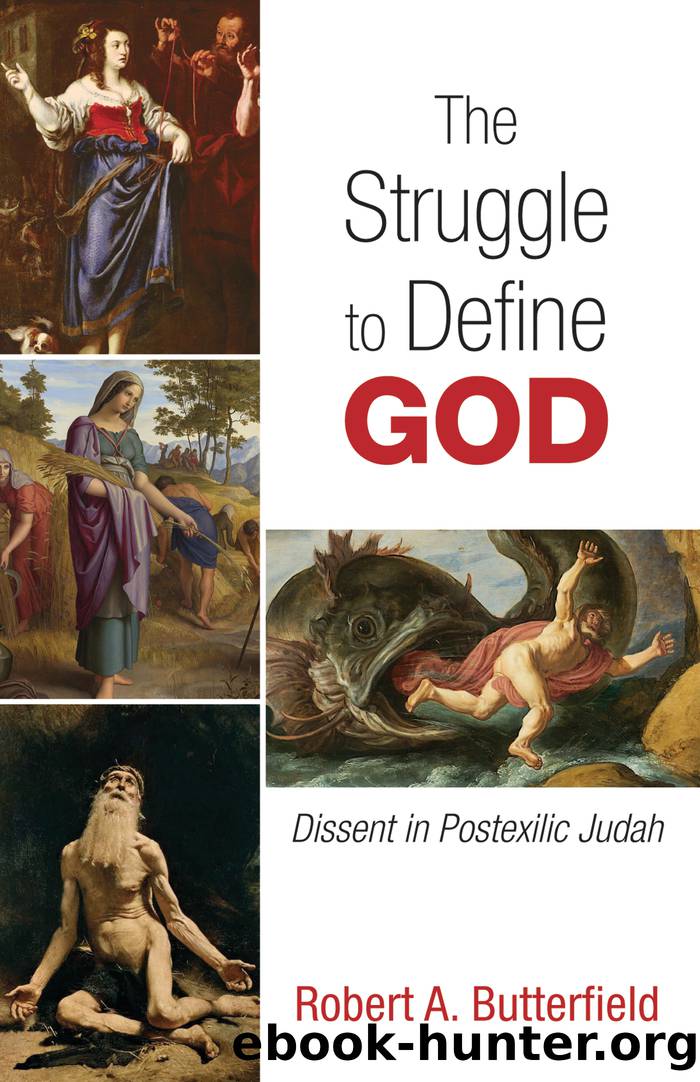The Struggle to Define God by Butterfield Robert A.;

Author:Butterfield, Robert A.; [Butterfield, Robert A.]
Language: eng
Format: epub
ISBN: 9781498242950
Publisher: Wipf and Stock Publishers
Published: 2017-05-02T07:00:00+00:00
Rahab
Preliminary Remarks
The relevance of the story of Rahab (Joshua 2) is that it shows God working through a foreignerâand, whatâs more, a womanâand thus reveals that God is radically inclusive and seeks to embrace all humankind. Although the action of the story takes place on the eve of the Israelite invasion of Canaan, this story does not come from that early period but rather dates from postexilic Judah. The reason for this postexilic dating is not only that, historically speaking, the Israelites never invaded Canaan, but also that postexilic Judah was a period in which women and foreigners for the first time became a politically important issue. Thus, a story about a foreign woman like Rahab would have been timely and relevant in the postexilic period, but not in any previous period.
The story of Rahab
Joshua, the commander of the Israelites, told his soldiers that their wives and children will remain on the east side of the Jordan while they, his fighting men, cross the river and take possession of the land of Canaan, which the Lord, the God of Israel, has assigned to them. But before such an invasion, Joshua secretly sends two spies to reconnoiter the city of Jericho.
The spies set out and come to the house of a harlot named Rahab. It is important to realize that Rahab is an excellent choice for a story about a foreigner because she is an extreme example of a foreigner. She is not some highly educated and respectable citizen whom one could imagine fitting in with the Jerusalem elite; she is a harlot. Her social status is very low, both because of her profession and because she is a woman alone in the world, without the protection of a man. Nothing at all is socially positive about her status. She is in every respect a counterintuitive choice as protagonist. The reason for making such a person the protagonist is that, if something good can happen with or through such an apparently debased foreign woman, the Jerusalem hardlinersâ policy of banning foreign wives will be discredited and rebutted. The aim of this story is precisely to shame the Jerusalem hardliners for their xenophobia and misogyny.
Returning to the story, when the two spies come to Rahabâs house, she gives them lodging. Immediately, the king of Jericho hears that spies have entered his territory, and he orders Rahab to turn these men over to him. But by then Rahab has hidden the two spies and responds to the kingâs orders with the following half-truth: âIt is true, the men did come to me, but I didnât know where they were from. And at dark, when the gate was about to be closed, the men left; and I donât know where the men went. Quick, go after them, for you can overtake them.â
Rahabâs lie is both bold and clever. Whatâs bold about it is that she is lying straight-facedânot to someone on the streetâbut to the king himself and on a matter of the gravest importance.
Download
This site does not store any files on its server. We only index and link to content provided by other sites. Please contact the content providers to delete copyright contents if any and email us, we'll remove relevant links or contents immediately.
Fangirl by Rainbow Rowell(8807)
How to Bang a Billionaire by Alexis Hall(7941)
Wonder by R. J. Palacio(7749)
The Space Between by Michelle L. Teichman(6587)
The Thirst by Nesbo Jo(6450)
Assassin’s Fate by Robin Hobb(5867)
Wiseguy by Nicholas Pileggi(5333)
The Night Circus by Erin Morgenstern(5041)
The Kite Runner by Khaled Hosseini(4962)
Paper Towns by Green John(4811)
Bittersweet (True North #1) by Sarina Bowen(4719)
Gerald's Game by Stephen King(4385)
Too Much and Not the Mood by Durga Chew-Bose(4103)
Pillow Thoughts by Courtney Peppernell(4031)
Goodbye Paradise(3462)
Twelve Days of Christmas by Debbie Macomber(3421)
Good by S. Walden(3360)
The Rosie Effect by Graeme Simsion(3223)
The Cellar by Natasha Preston(3079)
